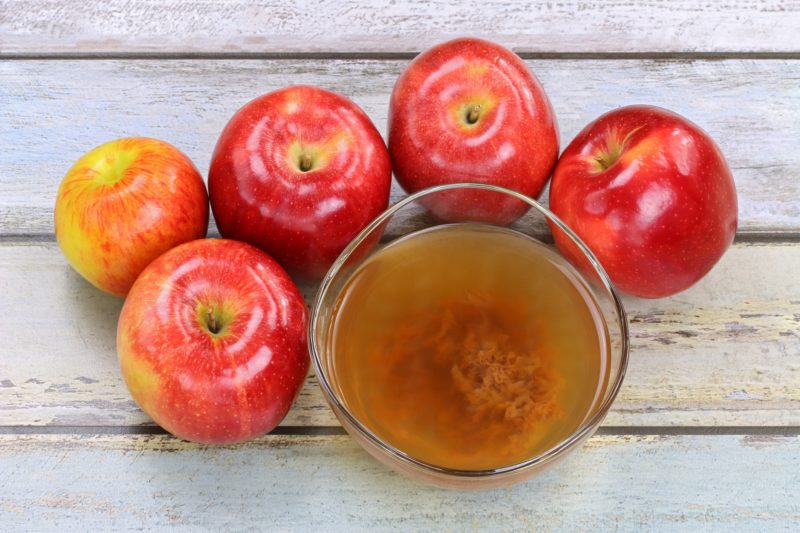Surprising Benefits of Apple Cider Vinegar
Apple Cider Vinegar (ACV) has been around for centuries. It was originally used to preserve food, add flavor and for certain health benefits. At one time it was also used as an antibiotic and in the treatment of scurvy. Nowadays, it’s no longer used to treat scurvy. But it’s still a mainstay in most households.
What is apple cider vinegar made of?
Apples…of course! Crushed apples produce a sugary liquid. This liquid is combined with yeast and allowed to ferment. Eventually, the mixture turns into alcohol. This alcohol then goes through another fermentation process resulting in the vinegar we use today.
What is the difference between “Distilled White Vinegar” and “Apple Cider Vinegar”?
Distilled white vinegar
White vinegar is produced, not through distillation, but through the fermentation of distilled alcohols. It is also called “Spirit Vinegar. It’s a clear, pungent liquid that can be used in hundreds of applications around the home. It is also used in cooking and pickling. There are stronger vinegars available aside from the commercial 5-8%. But they are more corrosive and harmful to exposed skin. Thus, they also require special handling.
Apple Cider Vinegar
ACV, as mentioned above, is produced from crushed apples and a double fermentation process. It is golden/brown and has a more mellow aroma than white vinegar. You may have seen labels for “unfiltered”, “unpasteurized” or “raw” vinegar. This means it contains the “mother”. The mother is really just a gelatinous glob that is a by-product of the fermentation process. It may be ugly but it’s totally harmless. In fact, some people swear the mother is what makes ACV so effective. If you’re considering making your own ACV, you can use the mother to start each new batch!
On a side note:
ACV that contains the “mother” can be dark and cloudy. However, there is another version that has been distilled and produces a clear, golden liquid. Although this distilled version can be used the same as the unpasturized version, the most health benefits result from using the “mother”.
[/vc_column_text][/vc_column][/vc_row]
What are the health benefits of Apple Cider Vinegar?
While many people claim to have had great success using ACV for certain ailments, it should be noted that many of these claims have not been backed up with sufficient testing. ACV is generally considered safe for most people to use. However, you should consult your doctor before starting an ACV regimen.
Health Benefit #1:
ACV helps reduce blood sugar spikes if taken before a meal. Generally, 4 tsps in a glass of water is all you need. It will not cure diabetes. But it has been suggested that this works best for those with insulin resistance.
Health Benefit #2:
The “mother” is considered a probiotic and is loaded with B vitamins and polyphenols.
Health Benefit #3:
Regular intake of ACV can improve gut bacteria. This may alleviate inflammation in people who suffer from rheumatoid arthritis and multiple sclerosis. It has also been suggested that it may help those who suffer from Polycystic Ovary Syndrome (PCOS).
Health Benefit #4:
ACV has been used to help people lose weight. According to research, apple cider vinegar, taken before a meal, can help a person feel fuller, thereby preventing the urge to overeat. Additionally, ACV has no calories, carbs, fat or fiber…so it’s safe for anyone regardless of diet. If you’d like to give it a try, add one tablespoon of ACV to a glass of water and drink before a meal.
Health Benefit #5:
There are claims that a regular dose of ACV can help manage or eliminate issues such as heart disease and cancer. Research indicates studies have been done…but not on people. So take this with a grain of salt. Again, always consult your doctor before making any changes.
Are there side affects from drinking Apple Cider Vinegar?
Short answer…yes. However, they can be avoided with proper dilution and limiting intake. It’s also important to mention that not everyone will experience these side effects. With that being said, the daily intake, for most people, is no more than 4 tablespoons spread throughout the day.
Side Effect #1:
ACV is highly acidic. Therefore, people with sensitive stomachs may make the problem worse by drinking it. And it can’t be said often enough…ACV should only be consumed after being diluted in water.
Side Effect #2:
It’s corrosive to teeth enamel. If you use ACV regularly, you should drink it from a straw or get in the habit of rinsing your mouth with clean water afterwards.
Side Effect #3:
Excess amounts of ACV can lead to lower blood potassium levels and possibly osteoporosis.
Side Effect #4:
Because of ACV’s high acidity, it can cause nausea, burping and possibly worsen an existing acid reflux condition. It should also be noted that people with chronic kidney disease may not be able to process the excess acid from ACV.
Side Effect #5:
ACV can burn. There have been cases of esophageal burns in people who drank ACV without diluting it. The same can happen when used on the skin. When it comes to ingesting it or putting it on your skin, ACV should never be used undiluted.
Is there any good news?
In spite of everything you’ve just read, many people have used ACV successfully without any issue. And I’m one of them! I have been using ACV in my homemade blackberry shrub for a few years now. It helped me break my addiction to sodas. But aside from cooking, ACV has a ton of other uses that don’t involve drinking it. Best of all, it doesn’t have an expiration date and doesn’t need to be refrigerated.
Click here if you want the recipe for Blackberry Shrub.
My Favorite Uses for Apple Cider Vinegar:
1. Combine ACV and two drops of dish soap in a small bowl to control fruit flies and gnats. The ACV attracts the critters and the soap creates a film on the surface that they can’t get out of. Discard and repeat every couple of days or as needed.
2. Add a splash to the water when boiling eggs. The ACV is reported to help the egg whites firm up faster. This is important if you have eggs that tend to crack before the boiling process really gets started.
3. Add 1/2 c. to a sink of water when rinsing fruits and veggies. Let sit for 30 minutes then rinse and let air dry before storing. Research shows that this process helps to remove dangerous bacteria like E. coli and salmonella.
4. Combine one part ACV with two parts water to create a face tonic. Apply with a cotton pad. If you have sensitive skin, you should dilute the ACV further. This same mixture can also be used to spot-treat problem acne.
5. ACV can be used as a hair rinse. Combine equal parts ACV and water in a squeeze bottle. Pour over newly washed hair and leave in for five minutes. Rinse well. This is also reported to help alleviate product build-up and produces shiny, healthier hair.
6. It is believed that because of its anti-fungal properties, ACV can help control dandruff. Combine 1/2 c. ACV in 1 1/2c. water and pour into a spray bottle. Apply to wet or dry hair. Does not need to be rinsed out. If itching or irritation occur, dilute further or discontinue use.
7. Use it full strength to kill weeds. Just be careful not to spray it on anything you’d like to keep around.
8. ACV can be used to minimize the sting and itch from bug bites and jellyfish stings. Just make sure to dilute it first!
9. There have been reports that ACV can aid in the removal of warts and skin tags. Apply diluted ACV to the area with a cotton ball until the wart or skin tag disappears or falls off.
10. Combine 1 part ACV and 2 parts water and apply after shaving. This is reported to reduce redness and irritation and my help prevent ingrown hairs.
Bonus tip: Soak your feet in 1 part ACV to 2 parts water. This helps to loosen and remove dead skin. Also, it is reported to help alleviate foot odor and athlete’s foot. Plus, it’s relaxing and is a good incentive to perform self-care!
If you have a favorite use for apple cider vinegar, I’d love to hear about it. Just leave a comment below. And feel free to share this post with someone you know who might enjoy it. If you need a reminder, you can print out this list of 10 surprising uses for Apple Cider Vinegar and keep it handy!
Until next time,
lisa
Subscribe
If you like what you see, click on the subscribe button so you don’t miss anything!
I promise not to spam you! By clicking the subscribe button, you agree to my privacy policy.








